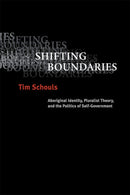Description
In Shifting Boundaries: Aboriginal Identity, Pluralist Theory, and the Politics of Self-Government, Tim Schouls presents a complex conceptual and normative analysis of the topic of Aboriginal self-government. Using the official transcripts from Canada's Royal Commission on Aboriginal Peoples (RCAP) as the basis of his work, Schouls attempts to establish a framework in which the relation between Aboriginal identity, pluralist theory and Aboriginal self-government can be understood. The book challenges contemporary assumptions that Aboriginal identity is framed in terms of cultural and national traits, and that the desire for Aboriginal self-government is an attempt to preserve such traits. Schouls argues that this approach offers an incomplete understanding of the politics of Aboriginal self-government and instead self-government is better understood when an ôidentificationö perspective on Aboriginal identity is utilized. Self-government. Schouls argues, is not about preserving cultural and national differences but about equalizing current imbalances in power to allow Aboriginals to construct their own identities. This argument is presented in relation to three sets of questions: the first set concerns questions of Aboriginal identity; the second, Aboriginal justification and intent for self-government; and the third, the limitations on Aboriginal political power. In focusing on relational pluralism, this work offers an important perspective to existing theoretical approaches to Aboriginal self-government. Tim Schouls teaches and conducts research in Canadian politics, Aboriginal governance issues and political theory at both the University of British Columbia and Capilano College. Shifting Boundaries will appeal to scholars, students and policy analysts interested in First Nations governance, cultural studies, political theory, nationalism studies and constitutional theory. A hardcover edition of this title is also available.


